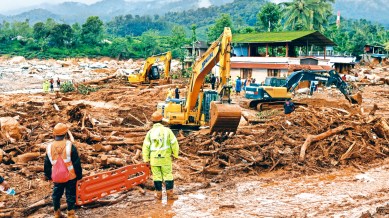Stay updated with the latest - Click here to follow us on Instagram
2 companies challenge takeover of their land for Wayand landslide survivors, but Kerala HC says ‘public interest has to prevail’
The High Court said the plantation companies should be paid compensation in accordance with provisions of the Land Acquisition Rehabilitation and Resettlement Act, 2013.

Rejecting petitions by two plantation companies that challenged the takeover of tracts of their land for a proposed township to rehabilitate victims of the Wayand landslides, the Kerala High Court observed that “the citizen holds his property subject always to the right of the sovereign to take it for a public purpose”.
“There is no lack of jurisdiction for the District Disaster Management Authority (DDMA) in the exercise of power under the Disaster Management Act to takeover/acquire property for the implementation of disaster management,” the court observed Friday.
The High Court said the plantation companies should be paid compensation in accordance with provisions of the Land Acquisition Rehabilitation and Resettlement Act, 2013.
After the landslide of July 30, which killed 298 people, the Kerala government issued orders to take over 65.41 hectares of estate land from Harrisons Malayalam and 78.73 hectares from Elstone Estates to construct townships to rehabilitate around 1,200 people rendered homeless in the disaster.
District authorities issued the orders as per the Disaster Management Act to cut short the long process of land acquisition as per the Land Acquisition Rehabilitation and Resettlement Act. However, the estate owners challenged the orders, leading to a delay in the rehabilitation process.
Reacting to the High Court verdict, Revenue Minister K Rajan said it “cleared clouds of uncertainty and anxiety that had covered the skies of Wayanad”.
“It is a verdict that has touched the heart of Wayanad. Steps for rehabilitation will gain momentum,” he said.
The High Court said, “The right of eminent domain (forced acquisition) is the right of the sovereign state, through its regular agencies, to reassert, either temporarily or permanently, dominion over any portion of the soil of the State, including private property, without its owner’s consent on account of public exigency and for the public good. It is inherent in every sovereign state to exercise its power of eminent domain to expropriate private property for public use without the owner’s consent.”
The court said any measures for rehabilitating disaster victims and repairing the damage caused by a disaster are within the powers of the DDMA.